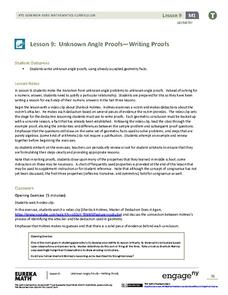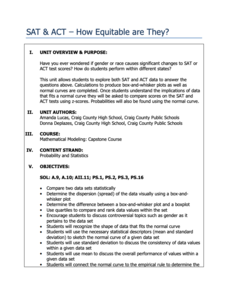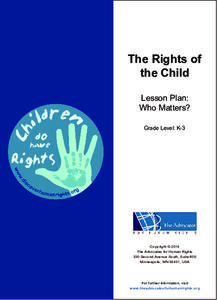EngageNY
Unknown Angle Proofs—Writing Proofs
What do Sherlock Holmes and geometry have in common? Why, it is a matter of deductive reasoning as the class learns how to justify each step of a problem. Pupils then present a known fact to ensure that their decision is correct.
Center for History and New Media
A Look at Virginians During Reconstruction, 1865-1877
The transition between rebellion to reunification was not smooth after the Civil War. Young historians compare primary and secondary source documents in a study of the Reconstruction era in Virginia, noting the rights that were not...
Tennessee State Museum
Understanding Women’s Suffrage: Tennessee’s Perfect 36
Tennessee was the pivotal state in ratifying women's suffrage in 1920, with its vote coming down to one man: Harry Burn, a 24-year old state representative who changed his nay to an aye on the advice of his mother. Learn more about...
Curriculum Corner
St. Patrick's Day Decimal Game
What better way to compare decimals than in a St. Patrick's Day themed game. Here, young leprechauns choose two cards from a stack, record the decimals on the provided worksheet, and compare them by using >, <, or =. Variate the...
J. Paul Getty Trust
Tag: Whose Values
Get young people thinking about their lives and current topics of social justice, advocacy, gender, race, and identity. After examining several works by Barbara Kruger, participants select a tag with one of the questions printed on it,...
Curriculum Corner
Academic Math Vocabulary
The ABCs of math are so important. Find commonly used math terms in a 42-page packet. Each page has the word, a place to write the definition, and a place to give specific examples of the term. A must-have for all math classrooms!
Noyce Foundation
Perfect Pair
What makes number pairs perfect? The resource provides five problems regarding perfect pairs of numbers, the definition of which changes in complexity with each task. Solutions require pupils to apply number sense and operations, as well...
Shodor Education Foundation
Equation Solver
Solve your equation and prove it, too. Young mathematicians solve linear equations using an interactive. They must input a property to justify each step of their solutions.
Southwest Miami Senior High School
US History Summer Instructional Packet
Can you boil the historical, cultural, and political events and movements from the last 150 years into a descriptive study guide? You don't have to—it's right here! A thorough resource includes informative text, discussion questions,...
Equality and Human Rights Commission
Actions and Consequences
Even the smallest actions can produce big consequences! Explore the results of both good and bad actions through an engaging activity. Grouped pupils analyze scenarios to examine the physical and emotional outcomes of teasing, bullying,...
Amnesty International
Respect My Rights, Respect My Dignity Module Three – Sexual and Reproductive Rights Are Human Rights
Give learners the support they need to take action in their communities when it comes to sexual and reproductive rights. A resource teaches the class about global issues surrounding gender inequality, including both readings and...
Wisconsin Historical Society
Civil Disobedience
When is civil disobedience acceptable? Class members read examples of Jim Crow laws, an excerpt from Dr. Martin Luther King's "Letter from a Birmingham Jail," and a newspaper article and then consider the factors that make a law just or...
National Park Service
Teaching with Historic Places: Discover the Jackie Robinson Ballpark
Can sports and popular culture change public opinion? That's the essential question asked by a lesson plan that looks at the role Jackie Robinson's appearance at City Island Ballpark in Daytona Beach, Florida played in the desegregation...
College Board
2008 AP® Human Geography Free-Response Questions
Interpreting demographics is no easy task. From the reason more girls go to school around the world to why people move within their own countries, the issues are complex. Short-answer prompts help learners unravel the questions as well...
PBS
“He Named Me Malala”: Understanding Student Activism Through Film
Malala Yousafzai has become the face of social activism. After watching He Named Me Malala and short student-made films about what young people can do to become instruments of change, class members reflect on what it means to be an...
Southern Poverty Law Center
Analyzing Gender Stereotypes in Media
Why might toy advertisers use gender stereotypes to sell their products? Young people think critically about media messages and its role in gender stereotyping with a thought-provoking lesson plan.
CK-12 Foundation
Integer Division: Dropping Anchor
An interactive made up of five questions challenges mathematicians to divide integers and reflect on division properties. A moveable anchor aids in problem-solving. Question types include multiple-choice, true or false, and discussion.
Radford University
SAT and ACT – How Equitable Are They?
Test the test takers' knowledge of statistics about data from the SAT and ACT tests. Future collegians explore the idea of gender and racial bias in high-stakes college admissions exams. They analyze historical data on average scores by...
Teaching Tolerance
Using Photographs to Teach Social Justice | Exploring Identity
Even without captions, photographs can tell amazing, involved, and complex stories. Viewers analyze two photos, consider what the pictures reveal about the subjects' identity, and determine the social justice issues represented in the...
Teaching Tolerance
Using Photographs to Teach Social Justice | Advertisements Promoting Activism
Activism can create real change. Class members examine a series of photographs that represent a different form of activism. Individuals then craft a persuasive speech in which they argue why the photo they chose is the best example of...
Equality and Human Rights Commission
Learning area 3: Explore a Wide Range of Jobs and Challenge Preconceptions
Squash the notion that certain jobs are meant for a boy or girl with a unit comprised of nine activities. Through discussion, videos, audio clips, worksheets, and readings, scholars examine stereotypes related to specific jobs and...
Teaching Tolerance
Why Do We (Still) Celebrate Columbus Day?
What are we really celebrating on Columbus Day? The resource explores the narrative behind Columbus Day and ways for people to change the perception. Scholars also review vocabulary terms associated with the topic and how attitudes have...
Just Health Action
Causes of the Causes: What Are the Root Causes of This Problem?
A "Causes of the Causes" diagram enables class members to examine the contributing factors to a problem. After reading a poem that models the process, class members, either in gorps or individually, diagram an issues they are passionate...
Advocates for Human Rights
The Rights of the Child
Dr. Seuss wrote " A person's a person, no matter how small." The elementary resource uses Dr. Seuss's book Horton Hears a Who to explore children's rights in an engaging way. Young academics listen to the story, participate in group...
Other popular searches
- Multiply Equals by Equals
- Equals Sign
- More Less Equals
- Shared Equals
- Equals One Number
- More, Less, Equals
- Equals to Equals
- Mg Equals
- Equals 31
- Multiply Equalsby Equals
- More\, Less\, Equals
- Each Coin Equals a Letter

























